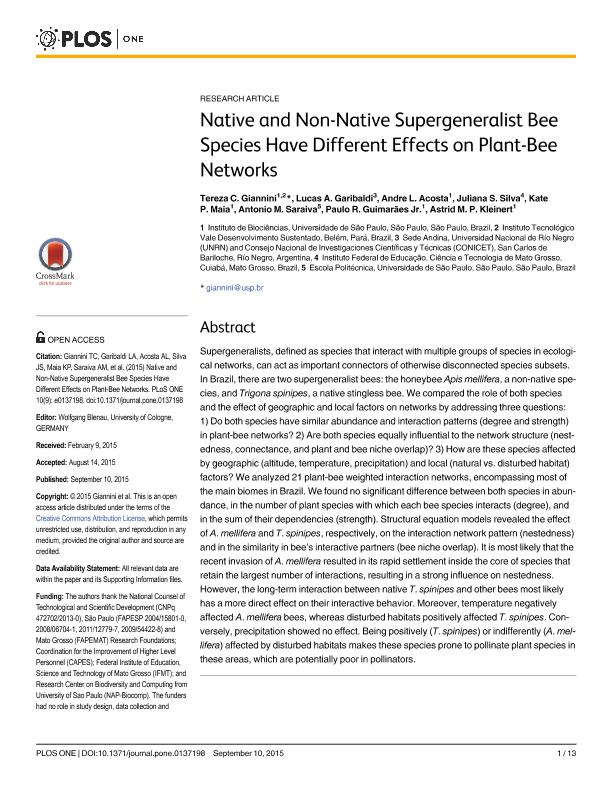Artículo
Native and non-native supergeneralist bee species have different effects on plant-bee networks
Giannini, Tereza C.; Garibaldi, Lucas Alejandro ; Acosta, Andre L.; Silva, Juliana S.; Maia, Kate P.; Saraiva, Antonio M.; Guimaraes, Paulo Roberto; Kleinert, Astrid de Matos Peixoto
; Acosta, Andre L.; Silva, Juliana S.; Maia, Kate P.; Saraiva, Antonio M.; Guimaraes, Paulo Roberto; Kleinert, Astrid de Matos Peixoto
 ; Acosta, Andre L.; Silva, Juliana S.; Maia, Kate P.; Saraiva, Antonio M.; Guimaraes, Paulo Roberto; Kleinert, Astrid de Matos Peixoto
; Acosta, Andre L.; Silva, Juliana S.; Maia, Kate P.; Saraiva, Antonio M.; Guimaraes, Paulo Roberto; Kleinert, Astrid de Matos Peixoto
Fecha de publicación:
09/2015
Editorial:
Public Library of Science
Revista:
Plos One
ISSN:
1932-6203
Idioma:
Inglés
Tipo de recurso:
Artículo publicado
Clasificación temática:
Resumen
Supergeneralists, defined as species that interact with multiple groups of species in ecological networks, can act as important connectors of otherwise disconnected species subsets. In Brazil, there are two supergeneralist bees: the honeybee Apis mellifera, a non-native species, and Trigona spinipes, a native stingless bee. We compared the role of both species and the effect of geographic and local factors on networks by addressing three questions: 1) Do both species have similar abundance and interaction patterns (degree and strength) in plant-bee networks? 2) Are both species equally influential to the network structure (nest-edness, connectance, and plant and bee niche overlap)? 3) How are these species affected by geographic (altitude, temperature, precipitation) and local (natural vs. disturbed habitat) factors? We analyzed 21 plant-bee weighted interaction networks, encompassing most of the main biomes in Brazil. We found no significant difference between both species in abundance, in the number of plant species with which each bee species interacts (degree), and in the sum of their dependencies (strength). Structural equation models revealed the effect of A. mellifera and T. spinipes, respectively, on the interaction network pattern (nestedness) and in the similarity in bee's interactive partners (bee niche overlap). It is most likely that the recent invasion of A. mellifera resulted in its rapid settlement inside the core of species that retain the largest number of interactions, resulting in a strong influence on nestedness. However, the long-term interaction between native T. spinipes and other bees most likely has a more direct effect on their interactive behavior. Moreover, temperature negatively affected A. mellifera bees, whereas disturbed habitats positively affected T. spinipes. Conversely, precipitation showed no effect. Being positively (T. spinipes) or indifferently (A. mellifera) affected by disturbed habitats makes these species prone to pollinate plant species in these areas, which are potentially poor in pollinators.
Palabras clave:
Plant-Bee Networks
,
Bee
,
Brazil
,
Supergeneralist
Archivos asociados
Licencia
Identificadores
Colecciones
Articulos(CCT - PATAGONIA NORTE)
Articulos de CTRO.CIENTIFICO TECNOL.CONICET - PATAGONIA NORTE
Articulos de CTRO.CIENTIFICO TECNOL.CONICET - PATAGONIA NORTE
Citación
Giannini, Tereza C.; Garibaldi, Lucas Alejandro; Acosta, Andre L.; Silva, Juliana S.; Maia, Kate P.; et al.; Native and non-native supergeneralist bee species have different effects on plant-bee networks; Public Library of Science; Plos One; 10; 9; 9-2015; 1-13
Compartir
Altmétricas



